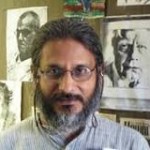 Inequality generates envy. Even a perfectly happy contented person or community can suddenly be made to feel poorer and unhappier in comparison if they are bombarded with vivid information of the over-achievement, opulence and overconsumption by a neighbor or a neighboring community. Envy is not only a form of suffering, it is a poisonous sentiment which, Adam Smith claims, human beings are naturally ashamed of. It makes them feel doubly small, first because they are objectively less successful and secondly because they are unable to celebrate others’ flourishing. Yet inequality and envy, its emotional counterpart, however morally jarring, appear to be the motivating factors of competition, economic, cultural or intellectual. How can competitiveness, which goads economic growth in a free market, lack of which was supposed to be the bane of socialist regimes, be rooted in such a morally deplorable sentiment as envy? Or is some form of emulative envy a virtue?
Inequality generates envy. Even a perfectly happy contented person or community can suddenly be made to feel poorer and unhappier in comparison if they are bombarded with vivid information of the over-achievement, opulence and overconsumption by a neighbor or a neighboring community. Envy is not only a form of suffering, it is a poisonous sentiment which, Adam Smith claims, human beings are naturally ashamed of. It makes them feel doubly small, first because they are objectively less successful and secondly because they are unable to celebrate others’ flourishing. Yet inequality and envy, its emotional counterpart, however morally jarring, appear to be the motivating factors of competition, economic, cultural or intellectual. How can competitiveness, which goads economic growth in a free market, lack of which was supposed to be the bane of socialist regimes, be rooted in such a morally deplorable sentiment as envy? Or is some form of emulative envy a virtue?
In this paper, the complex and obscure relationship between different varieties of envy and their distinction from jealousy and schadenfreude will be discussed. The moral psychology of envy will then be explored, primarily on the basis of the paradoxical relationships between equality, inequality and individual or communal competition.
Philosophy Seminar Series.
Date: Friday, 22 March 2013
Time: 2.30pm – 4.30pm
Venue: Philosophy Resource Room (AS3 #05-23)
Speaker: Arindam Chakrabarti, Professor of Philosophy, University of Hawai’i at Manoa
About the Speaker:
 Professor Arindam Chakrabarti, having done his M.A. in Philosophy and Mathematical Logic, from Presidency College Kolkata University, earned his D.Phil from Oxford University in 1982, working under Peter Strawson and Michael Dummett. He taught at Calcutta University and at University College London, Seattle and Delhi University, and for the last 15 years, at the University of Hawaii Manoa. After being trained as an analytic philosopher of language at Oxford, Professor Chakrabarti has spent several years receiving traditional training in Indian logic (Navya Nyaya). Prof Chakrabarti has edited or authored six books, in English, Sanskrit, and Bengali, including Denying Existence, Knowing from Words (with B.K. Matilal)Universals, Concepts and Qualities (with Peter Strawson) and has published more than eighty papers and reviews. He is currently working on a book on moral psychology of the emotions and another monograph on the Isha Upanishad.
Professor Arindam Chakrabarti, having done his M.A. in Philosophy and Mathematical Logic, from Presidency College Kolkata University, earned his D.Phil from Oxford University in 1982, working under Peter Strawson and Michael Dummett. He taught at Calcutta University and at University College London, Seattle and Delhi University, and for the last 15 years, at the University of Hawaii Manoa. After being trained as an analytic philosopher of language at Oxford, Professor Chakrabarti has spent several years receiving traditional training in Indian logic (Navya Nyaya). Prof Chakrabarti has edited or authored six books, in English, Sanskrit, and Bengali, including Denying Existence, Knowing from Words (with B.K. Matilal)Universals, Concepts and Qualities (with Peter Strawson) and has published more than eighty papers and reviews. He is currently working on a book on moral psychology of the emotions and another monograph on the Isha Upanishad.